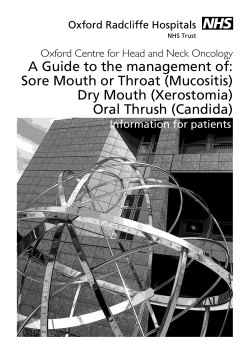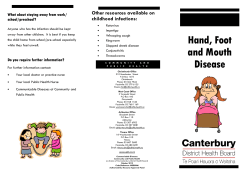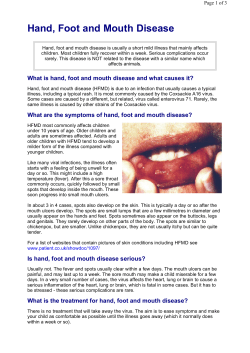
Managing Xerostomia Causes & Treatment Xerostomia
Managing Xerostomia Causes & Treatment Xerostomia Facts The main causes of xerostomia include: • Stress and anxiety • Side effects of drugs, alcohol, medications or chemotherapy Xerostomia is the medical term for a dry • Trauma to the salivary glands, ducts or Here are some suggestions to help manage your xerostomia: • Sip water regularly • Use a dry mouth fluoride toothpaste • Use 100% Xylitol gum or 100% nerves Xylitol mints to stimulate salivary flow • Dehydration while helping reduce bacterial count • Excessive mouth breathing • Previous radiation therapy or speaking • Natural result of aging • Burning feeling in the mouth Xerostomia may also be a sign of an • Dry feeling in the throat underlying problem or disease, such as • Cracked lips vitamin deficiencies, Sjögren’s syndrome or • Dry, rough tongue poorly controlled diabetes, but this is not • Mouth sores always so. • Infections in the mouth mouth due to a lack of saliva. Symptoms may include: • Sticky, dry feeling in the mouth • Trouble chewing, swallowing, tasting It is important to consult with your physician Why is saliva so important? and dentist if you are experiencing any Saliva does more than keep the mouth wet. symptoms of xerostomia. Treatment involves • It helps digest food. • It protects teeth from decay. • It prevents infection, including gum disease, by controlling bacteria and fungi in the mouth. • It makes it possible to chew and swallow. • Use over the counter saliva substitutes • Pay careful attention to oral hygiene • Visit your dentist regularly for cleanings or periodontal maintenance • Breath through your nose, not your mouth • Use a humidifier at night to increase air moisture • Avoid toothpastes that contain Sodium Lauryl Sulfate (SLS) • Avoid the use of decongestants and antihistamines finding any correctable causes and fixing those if possible. When the cause can't be • Avoid smoking or spit tobacco determined or can't be resolved, treatment • Avoid acidic foods, carbonated drinks, caffeinated drinks and alcohol focuses on relieving the symptoms and preventing cavities. • Avoid sugary foods and candy
© Copyright 2025





















